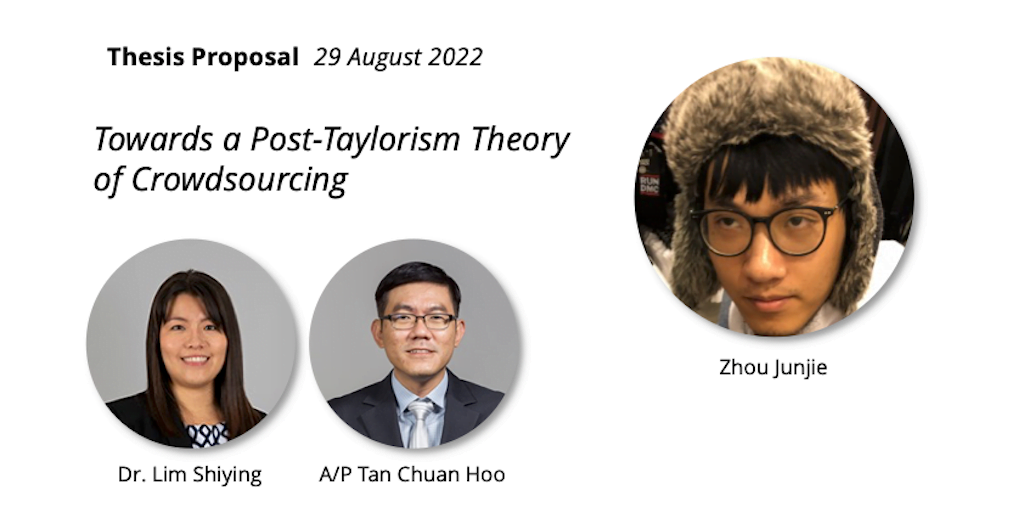
PhD Thesis Proposal — Junjie Zhou
Title: Towards a Post-Taylorism Theory of Crowdsourcing
Abstract:
Crowdsourcing is fast emerging as a mainstream innovation tool for firms. However, despite its wide adoption, crowdsourcing has been challenged with respect to its ability to solve wicked problems. In this thesis proposal, I argue that the theoretical foundation, the contexts studied, and the variables of interest in the existing studies and theory of crowdsourcing have been deeply rooted in the management paradigm of Taylorism and that this theoretical perspective, albeit valid, might not be suitable as theoretical guides to fully utilize the innovativeness of crowdsourcing for wicked problems because it overlooks knowledge (re)combination, complexity contingency, and crowdsourcing effectiveness. This thesis proposal proposes two studies that, combined, aim to develop a post-Taylorism theory of crowdsourcing that incorporates these important but neglected elements.
The first study focuses on the (re)combination among solution solvers (i.e., the crowd). It identifies and fills two research gaps. First, (re)combination among solution solvers takes place in a self-selection manner. Given the unfamiliarity with one another, solvers can hardly accurately evaluate the eventual outcomes of (re)combinations. Instead, different features provided by crowdsourcing platforms serve as signals for solvers to narrow the scope of consideration and gauge the quality of (re)combination. This study investigates how the use of different quality signals affects solvers’ performance after (re)combination. Second, (re)combination among solution solvers inherently reduces independent and parallel experimentation. It is not clear whether and how (re)combination will impact the quality of the solutions acquired by the solution seeker. I investigate under what contingencies (re)combination can compensate for the reduction in the parallel path effect for crowdsourcing effectiveness.
The second study focuses on the (re)combination between solution solvers (i.e., the crowd) and the solution seeker (i.e., the firm). It investigates an important but overlooked aspect of crowdsourcing — although massive parallel search can be conducted via crowdsourcing, all explored solutions still need to be evaluated and selected by the seeker. Solutions from crowdsourcing may be perceived as having high quality by the seeker but with slight effectiveness. This study investigates whether the perceived quality of crowdsourcing syncs with actual crowdsourcing effectiveness through the lens of the seeker’s knowledge. Given the potential misalignment between the perceived quality and effectiveness of crowdsourcing, I also investigate how firms might learn from the crowd to further crowdsourcing effectiveness and approach high-quality solutions.
Taken together, these two studies provide a novel theoretical perspective to better understand how solutions to wicked problems can be obtained via crowdsourcing.
